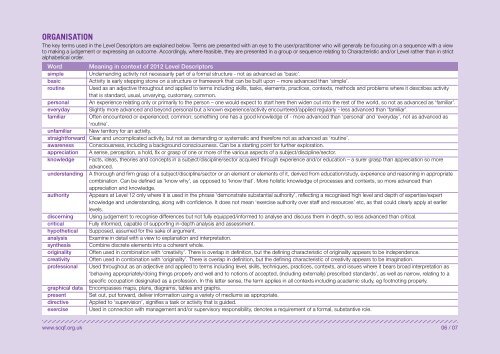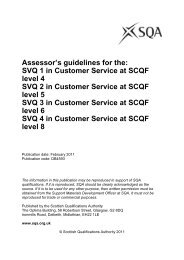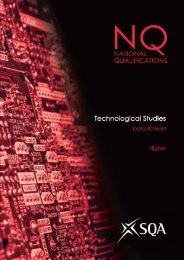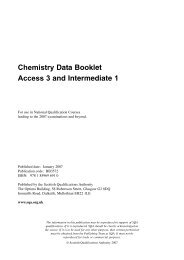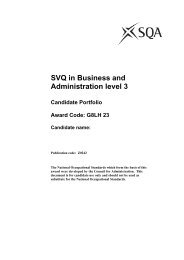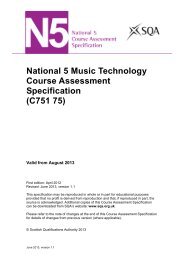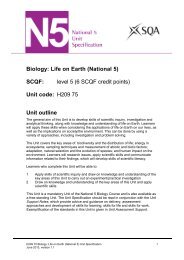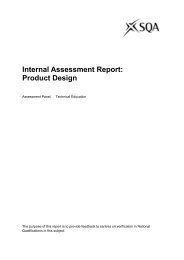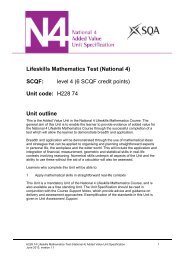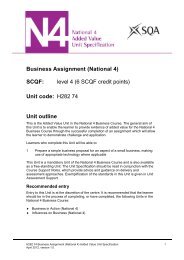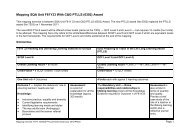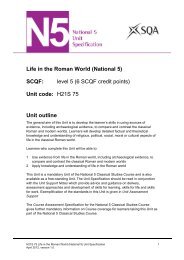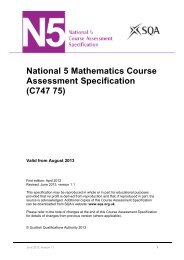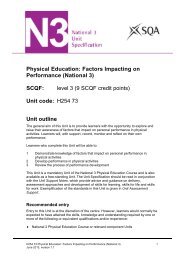Revised SCQF Level Descriptors - Scottish Credit and Qualifications ...
Revised SCQF Level Descriptors - Scottish Credit and Qualifications ...
Revised SCQF Level Descriptors - Scottish Credit and Qualifications ...
You also want an ePaper? Increase the reach of your titles
YUMPU automatically turns print PDFs into web optimized ePapers that Google loves.
ORGANISATION<br />
The key terms used in the <strong>Level</strong> <strong>Descriptors</strong> are explained below. Terms are presented with an eye to the user/practitioner who will generally be focusing on a sequence with a view<br />
to making a judgement or expressing an outcome. Accordingly, where feasible, they are presented in a group or sequence relating to Characteristic <strong>and</strong>/or <strong>Level</strong> rather than in strict<br />
alphabetical order.<br />
Word Meaning in context of 2012 <strong>Level</strong> <strong>Descriptors</strong><br />
simple Undem<strong>and</strong>ing activity not necessarily part of a formal structure - not as advanced as ‘basic’.<br />
basic<br />
Activity is early stepping stone on a structure or framework that can be built upon – more advanced than ‘simple’.<br />
routine Used as an adjective throughout <strong>and</strong> applied to terms including skills, tasks, elements, practices, contexts, methods <strong>and</strong> problems where it describes activity<br />
that is st<strong>and</strong>ard, usual, unvarying, customary, common.<br />
personal An experience relating only or primarily to the person – one would expect to start here then widen out into the rest of the world, so not as advanced as ‘familiar’.<br />
everyday Slightly more advanced <strong>and</strong> beyond personal but a known experience/activity encountered/applied regularly - less advanced than ‘familiar’.<br />
familiar Often encountered or experienced; common; something one has a good knowledge of - more advanced than ‘personal’ <strong>and</strong> ‘everyday’, not as advanced as<br />
‘routine’.<br />
unfamiliar New territory for an activity.<br />
straightforward Clear <strong>and</strong> uncomplicated activity, but not as dem<strong>and</strong>ing or systematic <strong>and</strong> therefore not as advanced as ‘routine’.<br />
awareness Consciousness, including a background consciousness. Can be a starting point for further exploration.<br />
appreciation A sense, perception, a hold, fix or grasp of one or more of the various aspects of a subject/discipline/sector.<br />
knowledge Facts, ideas, theories <strong>and</strong> concepts in a subject/discipline/sector acquired through experience <strong>and</strong>/or education – a surer grasp than appreciation so more<br />
advanced.<br />
underst<strong>and</strong>ing A thorough <strong>and</strong> firm grasp of a subject/discipline/sector or an element or elements of it, derived from education/study, experience <strong>and</strong> reasoning in appropriate<br />
combination. Can be defined as ‘know why’, as opposed to ‘know that’. More holistic knowledge of processes <strong>and</strong> contexts, so more advanced than<br />
appreciation <strong>and</strong> knowledge.<br />
authority Appears at <strong>Level</strong> 12 only where it is used in the phrase ‘demonstrate substantial authority’, reflecting a recognised high level <strong>and</strong> depth of expertise/expert<br />
knowledge <strong>and</strong> underst<strong>and</strong>ing, along with confidence. It does not mean ‘exercise authority over staff <strong>and</strong> resources’ etc, as that could clearly apply at earlier<br />
levels.<br />
discerning Using judgement to recognise differences but not fully equipped/informed to analyse <strong>and</strong> discuss them in depth, so less advanced than critical.<br />
critical Fully informed, capable of supporting in-depth analysis <strong>and</strong> assessment.<br />
hypothetical Supposed, assumed for the sake of argument.<br />
analysis Examine in detail with a view to explanation <strong>and</strong> interpretation.<br />
synthesis Combine discrete elements into a coherent whole.<br />
originality Often used in combination with ‘creativity’. There is overlap in definition, but the defining characteristic of originality appears to be independence.<br />
creativity Often used in combination with ‘originality’. There is overlap in definition, but the defining characteristic of creativity appears to be imagination.<br />
professional Used throughout as an adjective <strong>and</strong> applied to terms including level, skills, techniques, practices, contexts, <strong>and</strong> issues where it bears broad interpretation as<br />
‘behaving appropriately/doing things properly <strong>and</strong> well <strong>and</strong> to notions of accepted, (including externally) prescribed st<strong>and</strong>ards’, as well as narrow, relating to a<br />
specific occupation designated as a profession. In this latter sense, the term applies in all contexts including academic study, eg footnoting properly.<br />
graphical data Encompasses maps, plans, diagrams, tables <strong>and</strong> graphs.<br />
present Set out, put forward, deliver information using a variety of mediums as appropriate.<br />
directive Applied to ‘supervision’, signifies a task or activity that is guided.<br />
exercise Used in connection with management <strong>and</strong>/or supervisory responsibility, denotes a requirement of a formal, substantive role.<br />
////////////////////////////////////////////////////////////////////////////////////////////////////////////////<br />
www.scqf.org.uk 06 / 07


